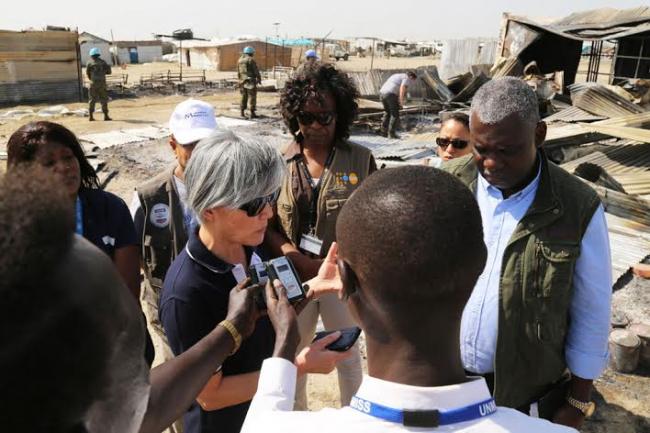12 Mar 2016

Speaking to reporters in New York, UN spokesperson Stéphane Dujarric said the focus of the inquiry would be on how the UN ion in South Sudan (UN) responded to clashes on 17 and 18 February in its protection of civilians site – a situation where civilians seek protection at existing UN bases amidst fighting.
Visiting Malakal a week after the incidents, Kyung-wha Kang, Assistant Secretary-General for Humanitarian Affairs and Deputy Emergency Relief Coordinator, said that civilians who had sought safety at the site had been attacked, killed, traumatised and displaced once more, with the entire site, including medical clinics and schools, completely and systematically burnt down and destroyed.
Also on Friday, the UN High Comioner for Refugees (UNHCR) said that fighting in South Sudan’s Western Equatoria state is forcing thousands of people to flee into the Central African Republic (CAR), the Democratic Republic of the Congo (DRC) and Uganda.
According to UNHCR spokesperson Leo Dobbs, the fighting in Western Equatoria is relatively new, having spread to the previously peaceful area in 2015. Since then, more than 11,000 people have crossed into DRC, and more than 14,000 into Uganda.
Many of the new arrivals fleeing from Western Equatoria “often walked for days, and are tired, hungry and in need of help,” . Dobbs told reporters in Geneva, referring to urgent needs for shelter, food, water, healthcare and security.
In the coming week, UNHCR wants to gain access to an estimated 7,000 South Sudanese refugees, mostly women and children, living in Bambouti, a hard-to-reach area of eastern CAR.
The new arrivals there have outnumbered the local population of about 1,500 people and have put a strain on food and water resources.
This has also given rise to health issues, including malaria, and diarrhoea, in a town that has just one midwife and a medical assistant, and lacks medicine and equipment.
Photo: OCHA/Charlotte Cans